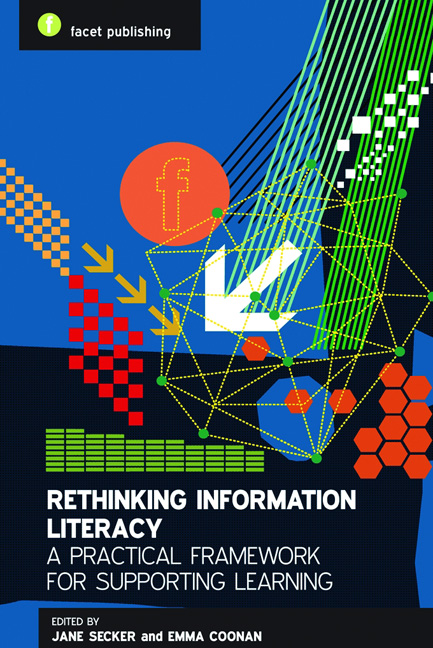Book contents
- Frontmatter
- Contents
- Acknowledgements
- Contributor profiles
- Introduction
- Strand One Transition from school to higher education
- Strand Two Becoming an independent learner
- Strand Three Developing academic literacies
- Strand Four Mapping and evaluating the information landscape
- Strand Five Resource discovery in your discipline
- Strand Six Managing information
- Strand Seven The ethical dimension of information
- Strand Eight Presenting and communicating knowledge
- Strand Nine Synthesizing information and creating new knowledge
- Strand Ten The social dimension of information
- Afterword: ‘Ownership is a flawed concept’
- Conclusion
- Appendix 1 A New Curriculum for Information Literacy (ANCIL): the curriculum
- Appendix 2 ANCIL Lesson Plan
- Appendix 3 ANCIL Institutional Audit: worksheet
- Appendix 4 ANCIL Institutional Audit: interview questions
- Index
- Miscellaneous Endmatter
- Miscellaneous Endmatter
- Miscellaneous Endmatter
- Miscellaneous Endmatter
Strand Ten - The social dimension of information
Published online by Cambridge University Press: 08 June 2018
- Frontmatter
- Contents
- Acknowledgements
- Contributor profiles
- Introduction
- Strand One Transition from school to higher education
- Strand Two Becoming an independent learner
- Strand Three Developing academic literacies
- Strand Four Mapping and evaluating the information landscape
- Strand Five Resource discovery in your discipline
- Strand Six Managing information
- Strand Seven The ethical dimension of information
- Strand Eight Presenting and communicating knowledge
- Strand Nine Synthesizing information and creating new knowledge
- Strand Ten The social dimension of information
- Afterword: ‘Ownership is a flawed concept’
- Conclusion
- Appendix 1 A New Curriculum for Information Literacy (ANCIL): the curriculum
- Appendix 2 ANCIL Lesson Plan
- Appendix 3 ANCIL Institutional Audit: worksheet
- Appendix 4 ANCIL Institutional Audit: interview questions
- Index
- Miscellaneous Endmatter
- Miscellaneous Endmatter
- Miscellaneous Endmatter
- Miscellaneous Endmatter
Summary
Strand Ten is perhaps the most transformational of all the strands as the learner evolves into a lifelong learner, developing a critical awareness of how their learning will continue beyond formal education. The strand supports the development of strategies for assimilating new information as well as information-handling, problem-solving and decision-making skills for the workplace and for the choices of daily life. Strand Ten also includes an understanding of the ethics and politics of information, so the learner develops strategies for assimilating and analysing information that might challenge their world view.
We first met Helen through her work on the Transkills project at the University of Cambridge, which seeks to facilitate the transition of first-year undergraduates from their prior learning experiences to study at university. It quickly became clear that there were many parallels between our work and Helen's project, and her background as a learning developer also led to many fascinating conversations. Transition is an important theme throughout ANCIL, appearing not only in Strand One (Transition into higher education) but perhaps more importantly in this final strand, as the transition out of the academic environment into lifelong learning. Helen's experience as an academic and learning developer, as well as her subsequent Arcadia research from October to December 2012 to explore strategies for implementing ANCIL, make this case study to explore the final tenth strand particularly welcome.
Background and institutional context
As a new profession, learning development draws on and complements various other professions which offer teaching, coaching, guidance and advice on information literacy, from subject lecturing, counselling, careers and disability support, to librarianship (see Hilsdon, 2011, 13–27). Those working in learning development may be located in various institutional contexts under different job titles, and bring with them a variety of professional backgrounds and theoretical frameworks (Murray and Glass, 2011). Some are located in Student Services, others in libraries, others in faculties and departments, and all work closely with colleagues from these sectors across an institution. Much of my work as a learning developer has taken the form of one-to-one sessions, experience which has been invaluable in informing my workshop provision and resource development with a learner-centred perspective.
- Type
- Chapter
- Information
- Rethinking Information LiteracyA practical framework for supporting learning, pp. 119 - 130Publisher: FacetPrint publication year: 2012



